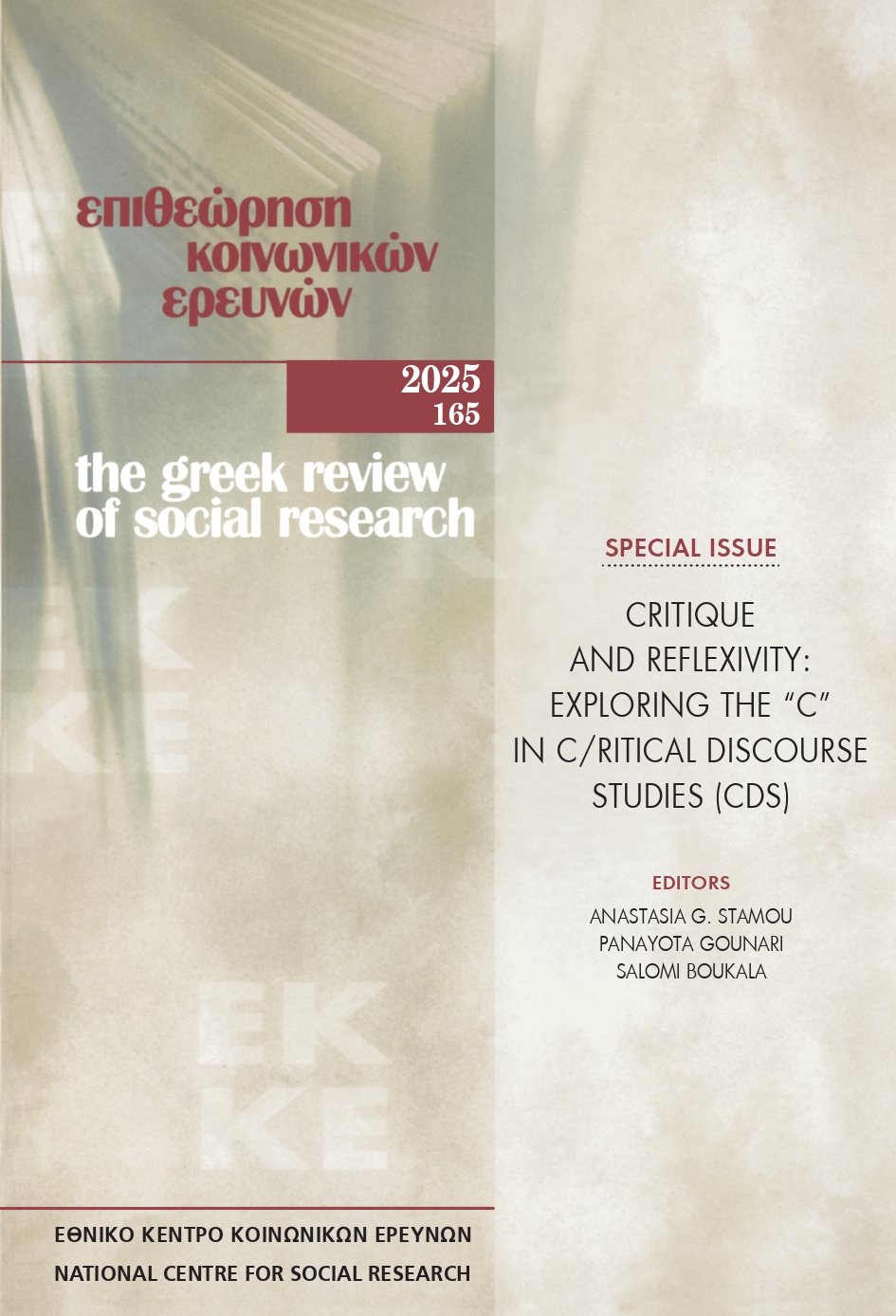Λόγος και διαμεσολάβηση: Mια ιστορική ανασκόπηση θεωρητικών αφηγήσεων και ερευνητικών κατευθύνσεων

Περίληψη
Το παρόν άρθρο εξετάζει βασικές εννοιολογήσεις του λόγου που έχουν διαμορφώσει την ακαδημαϊκή ανάλυση της διαμεσολάβησης, των επικοινωνιακών δικτύων και των πρακτικών της ψηφιακής νεωτερικότητας στις κοινωνικές και ανθρωπιστικές επιστήμες κατά τη διάρκεια του 20ού αιώνα. Επικεντρώνεται σε τέσσερα επιδραστικά εννοιολογικά πλαίσια μέσω των οποίων ο λόγος έχει προσεγγιστεί: (1) ο λόγος ως επικοινωνιακή εξουσία, (2) ο λόγος ως λαϊκή ενδυνάμωση, (3) ο λόγος ως κειμενοποίηση της εξουσίας, και (4) ο λόγος ως συμβολική εξουσία. Τα εν λόγω πλαίσια αποκαλύπτουν διακριτούς αναλυτικούς προσανατολισμούς ως προς τις πολιτικές και λαϊκές διαστάσεις της διαμεσολάβησης, και αντικατοπτρίζουν διαφορετικές κατανοήσεις της ισχύος του λόγου, όπως αυτή συγκροτείται μέσω των γλωσσικών και των οπτικών πόρων στη διαμόρφωση των κοινωνικών πραγματικοτήτων. Το άρθρο ολοκληρώνεται με μια συζήτηση για το πώς οι εννοιολογήσεις του λόγου και της εξουσίας αναδιαμορφώνονται στο πλαίσιο της μηχανικής μάθησης, της αλγοριθμικής διαμεσολάβησης και των μεγάλων δεδομένων στον ψηφιακό ορίζοντα του 21ου αιώνα.
Λεπτομέρειες άρθρου
- Πώς να δημιουργήσετε Αναφορές
-
Chouliaraki, L. (2025). Λόγος και διαμεσολάβηση: Mια ιστορική ανασκόπηση θεωρητικών αφηγήσεων και ερευνητικών κατευθύνσεων. Επιθεώρηση Κοινωνικών Ερευνών, 165, 75–94. https://doi.org/10.12681/grsr.42208
- Ενότητα
- Άρθρα

Αυτή η εργασία είναι αδειοδοτημένη υπό το CC Αναφορά Δημιουργού – Μη Εμπορική Χρήση 4.0.
Οι συγγραφείς των άρθρων που δημοσιεύονται στην Επιθεώρηση Κοινωνικών Ερευνών διατηρούν τα δικαιώματα πνευματικής ιδιοκτησίας επί των άρθρων τους, δίνοντας στο περιοδικό το δικαίωμα της πρώτης δημοσίευσης. Άρθρα που δημοσιεύονται στην Επιθεώρηση Κοινωνικών Ερευνών διατίθενται με άδεια Creative Commons 4.0 και σύμφωνα με την άδεια μπορούν να χρησιμοποιούνται ελεύθερα, με αναφορά στο/στη συγγραφέα και στην πρώτη δημοσίευση για μη κερδοσκοπικούς σκοπούς.
Το Εθνικό Κέντρο Κοινωνικών Ερευνών διατηρεί το δικαίωμα να δημοσιεύει, να αναπαραγάγει, να παρουσιάζει στο κοινό, να διανέμει και χρησιμοποιεί άρθρα που δημοσιεύονται στην Επιθεώρηση Κοινωνικών Ερευνών σε οποιοδήποτε μέσο και μορφή είτε μεμονωμένα είτε ως μέρη συλλογικών έργων, για όλο τον χρόνο διάρκειας προστασίας της πνευματικής ιδιοκτησίας και για όλες τις χώρες του κόσμου. Αυτό περιλαμβάνει ενδεικτικά και όχι αποκλειστικά το δικαίωμα δημοσίευσης των άρθρων σε τεύχη της Επιθεώρησης Κοινωνικών Ερευνών, αναπαραγωγής και διανομής μεμονωμένων αντιγράφων των άρθρων, αναπαραγωγής ολόκληρων των άρθρων σε άλλη έκδοση του Εθνικού Κέντρου Κοινωνικών Ερευνών, καθώς και αναπαραγωγής και διανομής των άρθρων ή περίληψης αυτών με χρήση πληροφορικού συστήματος αποθετηρίου.


